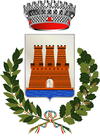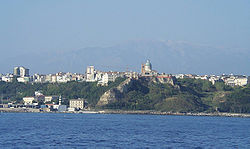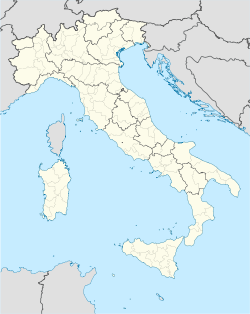- Ortona
-
Ortona — Comune — Città di Ortona A view of Ortona from the sea. 
Coat of armsLocation of Ortona in Italy Coordinates: 42°21′N 14°24′E / 42.35°N 14.4°ECoordinates: 42°21′N 14°24′E / 42.35°N 14.4°E Country Italy Region Abruzzo Province Chieti (CH) Frazioni Alboreto, Aquilano, Caldari, Colombo, Cucullo, Feudo, Fontegrande, Foro, Fossato, Gagliarda, Iurisci, Lazzaretto, Lido Riccio, Madonna delle Grazie, Ranchini, Riccio, Ripari Bardella, Rogatti, Ruscitti, San Donato, San Leonardo, San Marco, San Pietro, Santa Lucia, Savini, Tamarete, Vaccari, Villa Deo, Villa Grande, Villa Iubatti, Villa Pincione, Villa San Leonardo, Villa San Nicola, Villa San Tommaso, Villa Torre Government - Mayor Nicola Fratino (since June, 2007) Area - Total 70 km2 (27 sq mi) Elevation 72 m (236 ft) Population - Total 23,500 - Density 335.7/km2 (869.5/sq mi) Demonym Ortonesi Time zone CET (UTC+1) - Summer (DST) CEST (UTC+2) Postal code 66026 Dialing code 085 Patron saint St. Thomas Saint day First sunday of May Website Official website Ortona is a coastal town and municipality of the Province of Chieti in the Italian region of Abruzzo, with some 23,000 inhabitants.
Ortona was the site of fierce fighting between German and Canadian forces during the Italian campaign in World War II. The ferocity of the battle led it to be known as the "Little Stalingrad" as Winston Churchill called this city, (See Battle of Ortona).
Contents
History
The origins of Ortona are uncertain. Presumably, it was first inhabited by the Frentani, an Italic population. In 2005, during works near the Castle, a Bronze Age settlement was discovered, and the Roman town largely coincided with this first settlement. Some sections of paved roads and urban walls, as well as some archaeological findings are the only remains of this period. Ortona remained a part of the Roman Empire (i.e., the Byzantine Empire) for several centuries, before it was annexed by the Kingdom of the Lombards. In 803 the Franks incorporated Ortona into the county of Chieti. From that date on, the town remained tied to Chieti and its territory.
In 1258 the relics of St. Thomas were brought to Ortona from the Greek island of Chios. In the first half of the 15th century its walls were built, and during this period Ortona fought with the nearby town of Lanciano in a fierce war that ended in 1427. On June 30, 1447, ships from Venice destroyed the port of Ortona; consequently the King of Sicily at that time commissioned the construction of a Castle to dominate the renovated port. In 1582 the town was acquired by Margaret of Parma, daughter of Emperor Charles V and Duchess of Parma. In 1584 Margaret decided to build a great mansion (known as Palazzo Farnese), which was never completed due to her death.
After the establishment of the Kingdom of Italy in 1860, Ortona became one of the first sea resorts on the Adriatic sea. During World War II, on September 9, 1943 the royal family of the House of Savoy left Nazi occupied Italy from the port of Ortona. The defensive Gustav Line was established by the Germans at Ortona (extending towards Cassino on the opposite side of Italy). The strategic importance of Ortona within the German defences led to fierce fighting in and around the town between German and Canadian troops during the Battle of Ortona.
Main sights
Ortona is home of several pleasant beaches and one historical museum based on the battle of Ortona. The Parco Nazionale d'Abruzzo is not far also.
Culture
The composer Sir Francesco Paolo Tosti was born in Ortona, as were members of the Cascella family of artists. The well-known hard-core pornographic actor and producer Rocco Tano (Siffredi) was born in Ortona.
See also
References
- Christie, N. M. (2001). Hard-won Victory: the Canadians at Ortona 1943. Ottawa: CEF Books.
- Zuehlke, Mark (1999). Ortona: Canada's epic World War II battle. Toronto: Stoddart.
Notes
External links
 Media related to Ortona at Wikimedia Commons
Media related to Ortona at Wikimedia Commons Chisholm, Hugh, ed (1911). "Ortona a Mare". Encyclopædia Britannica (11th ed.). Cambridge University Press.
Chisholm, Hugh, ed (1911). "Ortona a Mare". Encyclopædia Britannica (11th ed.). Cambridge University Press.
Categories:- Cities and towns in Abruzzo
- Communes of the Province of Chieti
- Coastal towns in Abruzzo
Wikimedia Foundation. 2010.



